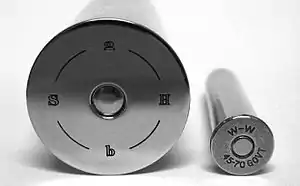2 bore
Two bore or 2 bore is an obsolete firearm caliber.
Specifications
Two bores generally fire spherical balls or slugs of hardened lead or, in the modern metallic cartridge, additionally a solid bronze projectile. The nominal bore is 1.326 inches (33.7 mm), and projectiles generally weigh 8 ounces (227 grams; 3500 grains). The velocity is relatively low, at around 1,500 feet per second (460 m/s) at the muzzle, but develops approximately 17,500 ft⋅lbf (23,700 J) muzzle energy.
History and background
Despite the popularity of the calibre in modern gun lore there is no evidence the 2 bore as named was actually used as a terrestrial and shoulder fired firearm. The equivalent calibre size equates to various punt guns used for harvesting large number of waterfowls usually mounted in 'punts' or flat bottomed boats for commercial purposes. A common misconception is the hunter Sir Samuel White Baker being attributed to its use, however his firearm 'Baby' as described below was actually close to 3 bore, the firearms records still exist by the maker listing the serial number as 1296. The confusion occurs due to Baker's common reference to the projectile fired from the firearm weighing 'half a pound', which would if a round ball equate to a 2 bore by definition. However Baker himself never refers to this projectile being a round ball nor uses the term 2 bore in any of his writings, indicating this half pound shell was a longer projectile of cylindrical or conical shape.
Among other weapons, I had an extraordinary rifle that carried a half-pound percussion shell—this instrument of torture to the hunter was not sufficiently heavy for the weight of the projectile; it only weighed twenty pounds: thus, with a charge of ten drachms [270 grains] of powder, behind a half-pound shell, the recoil was so terrific, that I spun around like a weathercock in a hurricane. I really dreaded my own rifle, although I had been accustomed to heavy charges of powder, and severe recoil for some years. None of my men could fire it, and it was looked upon with a species of awe, and it was named "Jenna-El-Mootfah" (Child of a Cannon) by the Arabs, which being far too long a name for practice, I christened it the "Baby;" and the scream of this "Baby" loaded with a half-pound shell was always fatal. It was far too severe, and I very seldom fired it, but it is a curious fact, that I never fired a shot with that rifle without bagging: the entire practice, during several years, was confined to about twenty shots. I was afraid to use it; but now and then it was absolutely necessary that it should be cleaned, after months of staying loaded. On such occasions my men had the gratification of firing it, and the explosion was always accompanied by two men falling on their backs (one having propped up the shooter), and the "Baby" flying some yards behind them. This rifle was made by Holland & Holland, of Bond Street, and I could highly recommend it for the Goliath of Gath, but not for the men of A.D. 1866.[1]
— Sir Samuel White Baker
Schroeder & Hetzendorfer cartridge
| Schroeder & Hetzendorfer 2 bore metallic cartridge | ||||||||||||
|---|---|---|---|---|---|---|---|---|---|---|---|---|
 2-bore and .45-70 | ||||||||||||
| Type | Rifle | |||||||||||
| Place of origin | ||||||||||||
| Production history | ||||||||||||
| Designer | Rudolph Schroeder | |||||||||||
| Manufacturer | Schroeder & Hetzendorfer LLC | |||||||||||
| Variants | 2 | |||||||||||
| Specifications | ||||||||||||
| Parent case | Proprietary | |||||||||||
| Case type | Semi-rimmed, straight | |||||||||||
| Bullet diameter | 1.326" | |||||||||||
| Rim diameter | 1.490" | |||||||||||
| Rim thickness | .125" | |||||||||||
| Case length | 3.50" | |||||||||||
| Case capacity | 935 gr H2O (60.6 cm3) | |||||||||||
| Rifling twist | 1:48" | |||||||||||
| Primer type | 35 arsenal | |||||||||||
| Filling weight | 700 grains ffg | |||||||||||
| Ballistic performance | ||||||||||||
| ||||||||||||
| Test barrel length: 28" Source(s): Design and test data | ||||||||||||
See also
References
- Samuel Baker, The Albert N'Yanza, Great Basin Of The Nile, p. 138, Macmillan, 1866, OCLC 32791208.